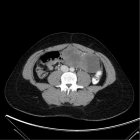Abstract
Research Article
Maternal mortality and factors affecting it, among pregnant women in Abeokuta South, Nigeria
Tumilara Busayo Amoo* and Oyinkansola Sarah Ajayi
Published: 02 July, 2019 | Volume 2 - Issue 2 | Pages: 071-078
This observational study assessed the knowledge of pregnant women attending antenatal clinics at two selected hospitals in Abeokuta South, Nigeria on the causes and risk factors of maternal mortality, identified barriers to knowledge acquisition, and examined the influence of parity of respondents on their knowledge of factors causing maternal mortality. Maternal mortality is extremely high in Nigeria, it is defined as the death of a woman while pregnant or within 42 days of termination of pregnancy, irrespective of the duration and site of the pregnancy, from any cause related to or aggravated by the pregnancy or its management but not from accidental or incidental causes. Descriptive research design was used in this study and qualitative data from 136 respondents selected randomly, were obtained through a self-designed questionnaire that comprised three sections. Data were analyzed and indicated that parity of the pregnant women do not have an influence on their knowledge of factors responsible for maternal mortality. Findings revealed that majority (67.6%) of the respondents had high knowledge on the causes of maternal mortality – haemorrhage, sepsis, prolonged/obstructed labour, anaemia, unsafe abortion, infection, hypertensive disorders, care rendered by unskilled medical practitioners and its risk factors - parity, poverty, place of last delivery and low attendance at antenatal clinic. Educational background, marital status, irregular antenatal visits, socio-cultural practices and occupational status were identified as barriers to knowledge acquisition. This paper concluded that pregnant women may have a high knowledge about the factors responsible for maternal mortality. This is probably due to the fact that all respondents had formal education and because they were interviewed on antenatal clinic days, which suggests that they might have heard about the causes and risk factors for maternal mortality during their visits. Authors recommended that government should employ qualified health professionals and provide medical subsidy, it is hoped that this will ensure that pregnant women get quality care throughout the period of pregnancy and delivery.
Read Full Article HTML DOI: 10.29328/journal.cjog.1001025 Cite this Article Read Full Article PDF
Keywords:
Antenatal; Causes; Knowledge; Maternal mortality; Pregnant women; Risk factors
References
- Adewole I. Nigeria sets up task force to reduce maternal mortality. The Eagle Online. 2017. Ref.: https://tinyurl.com/yxsqlfhe
- World Health Organization. Maternal Mortality Fact sheet. Geneva: World Health Organization. 2018. Ref.: https://tinyurl.com/y6kqygtv
- Mordi M. Maternal Mortality in Northern Nigeria still at an alarming rate. The Guardian. 2019.
- World Health Organization.WHO guidance for measuring maternal mortality from a census. Geneva: World Health Organization. 2013. Ref.: https://tinyurl.com/yxcap84u
- Ezugwu E, Onah H, Ezugwu F, Okafor I. Maternal mortality in a transitional hospital in Enugu South east Nigeria. Afr J Reprod Health. 2009; 13: 67-72. Ref.: https://tinyurl.com/y4y8akwe
- Igbwegbe A, Eleje G, Ugboaja J, Ofiaeli R. Improving maternal mortality at auniversity teaching hospital in Nnewi, Nigeria. Int J Gynaecol Obstet. 2012; 116: 197-200. Ref.: https://tinyurl.com/y4xevp4b
- Omo-Aghoja L, Aisien O, Akuse J, Bergstrom S, Okonofua F. Maternal mortality and emergency obstetric care in Benin City, South-south Nigeria. J Clinical Medicine Research. 2010; 2: 55-60. Ref.: https://tinyurl.com/y6553lvz
- Oates M. Perinatal psychiatric disorders: a leading cause of maternal morbidity and mortality. Br Med Bull. 2003; 67: 219-229. Ref.: https://tinyurl.com/y497otvh
- Bauserman M, Lokangaka A, Thorsten V, Tshefu A, Goudar S, et al. Risk factors for maternal death and trends in maternal mortality in low-and middle-income countries: a prospective longitudinal cohort analysis. Reprod Health. 2015; 12: S2-S5. Ref.: https://tinyurl.com/yxwegutw
- Nafiu LA, Kabir U, Adiukwu R. Risk Factors for Maternal Mortality in Nigeria. The Pacific J Sci Technol. 2016; 17: 310-317. Ref.: https://tinyurl.com/y4f2d3c8
- Ntoimo L, Okonofua F, Ogu R, Galadanci H, Gana M, et al. Prevalence and risk factors for maternal mortality in referral hospitals in Nigeria: a multicentre study. Int J Womens Health. 2018; 10: 69-76. Ref.: https://tinyurl.com/y55spk8u
- Azuh D, Azuh A, Iweala E, Adeloye D, Akanbi M, et al. Factors influencing maternal mortality among rural communities in southwestern Nigeria. Int J Womens Health. 2017; 9: 179-188. Ref.:
https://tinyurl.com/y6pvq5df - Ujah IA, Aisien OA, Mutihir JT, Vanderjagt DJ, Glew RH, et al. Factors Contributing to Maternal Mortality in North-Central Nigeria: A Seventeen-year Review. Afr J Reprod Health. 2005; 9: 27-40. Ref.: https://tinyurl.com/yxcs9b6n
- Lanre-Abass B. Poverty and maternal mortality in Nigeria: towards a more viable ethics of modern medical practice. Int J Equity Health. 2008; 7: 1-9. Ref.: https://tinyurl.com/y43s63kp
- Say L, Chou D, Gemmill A, Tuncalp O, Moller A, et al. Global causes of maternal death: a WHO systematic analysis. Lancet Glob Health. 2014; 2: e323-e333. Ref.: https://tinyurl.com/y6enu9gn
- Mocumbi A, Sliwa K, Soma-Pillay P. Medical disease as a cause of maternal mortality: the pre-imminence of cardiovascular pathology. Cardiovasc J Afr. 2016; 27: 84-88. Ref.: https://tinyurl.com/y22ldvkx
- Evance I, Godfrey M, Honorati M, Kathleen K. Causes and Risk Factors for Maternal Mortality in Rural Tanzania- Case of Rufiji Health and Demographic Surveillance Site. Afr J Reprod Health. 2013; 17: 119-130. Ref.: https://tinyurl.com/y5gmc2lb
- United Nations Development Programme. Goal 3: Good Health and Well-being. 2016.
- Sustainable Development Goals Tracker. Sustainable Development Goal 3 Ensure Healthy lives and promote well-being for all at all ages. 2015.
- Faduyile FA, Soyemi SS, Emiogun FE, Obafunwa JO. A 10 years autopsy-based study of maternal mortality in Lagos State University Teaching Hospital. Niger J Clin Pract. 2017; 20: 131-135. Ref.: https://tinyurl.com/y327fvvw
- Rogo K, Oucho J, Mwalali P. Maternal Mortality. In; D.T. Jamison, R.G. Feachem, M.W. Makgoba et al., (2nd eds.), Disease and Mortality in Sub-Saharan Africa. Washington DC: The International Bank for Reconstruction and Development/ The World Bank. 2006.
- Haeri S, Dildy G. Maternal Mortality from Hemorrhage. Semin Peritanol. 2012; 36: 48-55. Ref.:
https://tinyurl.com/yxrk5uw7 - Oye-Adeniran B, Odeyemi K, Gbadegesin A, Akin-Adenekan O, Akinsola O, et al. Causes of maternal mortality in Lagos State, Nigeria. Annals of Tropical Medicine and Public Health, 2014; 7: 177-181. Ref.: https://tinyurl.com/y5k2z2xa
- Neilson J, Lavender T, Quenby S, Wray S. Obstructed labour: Reducing maternal death and disability during pregnancy. British Medical Bulletin. 2003; 67: 191-204.
- Anand A. Anaemia—a major cause of maternal death. Indian Med Trib. 1995; 3: 5-8. Ref.:
https://tinyurl.com/y4m4w53j - Brabin B, Hakimi M, Pelletier D. An Analysis of Anemia and Pregnancy-Related Maternal Mortality. J Nutr. 2001; 131: 604S-615S. Ref.: https://tinyurl.com/y382tmts
- New S, Wirth M. Anaemia, pregnancy and maternal mortality: the problem with globally standardised haemoglobin cutoffs. BJOG, 2014; 122: 166-169. Ref.: https://tinyurl.com/y2gqr8td
- Daru J, Zamora J, Fernandez-Felix B, Vogel J, Oladapo O, et al. Risk of maternal mortality in women with severe anaemia during pregnancy and post partum: a multilevel analysis. Lancet Glob Health. 2018; 6: E548-E554. Ref.: https://tinyurl.com/y2zlrzjg
- Khaskheli M, Baloch S, Sheeba A, Baloch S, Khaskheli F. Iron deficiency anaemia is still a major killer of pregnant women. Pak J Med Sci. 2016; 32: 630-634. Ref.: https://tinyurl.com/y2b5e4qr
- Wu H. Anemia doubles risk of death for pregnant women, study finds. CNN. 2018.
- Okonofua F. Abortion and Maternal Mortality in the Developing World. J Obstet Gyanecol Can. 2006; 28: 974-979. Ref.: https://tinyurl.com/yy37rg2y
- Haddad L, Nour N. Unsafe Abortion: Unnecessary Maternal Mortality. Rev Obstet Gynecol. 2009; 2: 122-126. Ref.: https://tinyurl.com/y3acltlp
- Akpanekpo E, Umoessien E, Frank E. Unsafe Abortion and Maternal Mortality in Nigeria: A Review. Pan-African Journal of Medicine, 2017; 1: 1-6.
- Halder A, Vijayselvi R, Jose R. Changing perspectives of infectious causes of maternal mortality. J Turk Ger Gynecol Assoc. 2015; 16: 208-213. Ref.: https://tinyurl.com/y6hah39r
- Duley L. Maternal mortality associated with hypertensive disorders of pregnancy in Africa, Asia, Latin America and the Carribean. Br J Obstet Gynaecol. 1992; 99: 547-553. Ref.: https://tinyurl.com/y5qyem9c
- Moodley J. Maternal deaths due to hypertensive disorders in pregnancy. Best Practice and Research in Clinical Obstetrics and Gynaecology. 2008; 22: 559-567.
- Lo J, Mission J, Caughey A. Hypertensive disease of pregnancy and maternal mortality. Curr Opin Obstet Gynecol. 2013; 25: 124-132. Ref.: https://tinyurl.com/y58jd354
- Nakimuli A, Nakubulwa S, Kakaire O, Osinde M, Mbalinda S, et al. The burden of maternal morbidity and mortality attributable to hypertensive disorders in pregnancy: a prospective cohort study from Uganda. BMC Pregnancy and Childbirth. 2016; 16: 1-8. Ref.: https://tinyurl.com/y3goedsn
- Collier C, Martin J. Hypertensive disorders of pregnancy. Contemporary Obstetrics and Gynaecology. 2018; 5.
- Adams A. Quacks Identified as Major Cause of Maternal Deaths in Lagos. International Centre for Investigative Reporting. 2014.
- Sumankuuro J, Crockett J, Wang S. Maternal health care initiatives: Causes of morbidities and mortalities in two rural districts of Upper West Region, Ghana. PLOS One. 2017; 12: e0183644. Ref.: https://tinyurl.com/y6sjlf9n
- Armenakis A, Kiefer C. Social & Cultural Factors Related to Health Part A: Recognizing the impact. 2007.
- Ensor T, Quigley P, Green C, Badru A, Kaluba D, et al. Knowledgeable antenatal care as a pathway to skilled delivery: modelling the interactions between the use of services and knowledge in Zambia. Health Policy Plan. 2014; 29: 580-588. Ref.: https://tinyurl.com/y3brh5h9
Figures:
Similar Articles
-
Screening of Gestational diabetes mellitusGehan Farid*,Sarah Rabie Ali*,Reem Mohammed Kamal. Screening of Gestational diabetes mellitus . . 2018 doi: 10.29328/journal.cjog.1001003; 1: 014-023
-
Maternal and fetal outcome of comparative study between old & adopted new value of screening of Gestational Diabetes Mellitus in tertiary centre in Saudi ArabiaGehan Farid*,Reem Mohammed Kamal*,Mohamed AH Swaraldahab,Sarah Rabie Ali. Maternal and fetal outcome of comparative study between old & adopted new value of screening of Gestational Diabetes Mellitus in tertiary centre in Saudi Arabia. . 2018 doi: 10.29328/journal.cjog.1001005; 1: 026-034
-
Perinatal Morbidity & Mortality following repeat Cesarean section due to five or more previous Cesarean Section done in Tertiary centre in KSASomia Osman,Gehan Farid*,Reem Mohamed Kamal,Sarah Rabie Ali,Mohamed AH Swaraldahab. Perinatal Morbidity & Mortality following repeat Cesarean section due to five or more previous Cesarean Section done in Tertiary centre in KSA. . 2018 doi: 10.29328/journal.cjog.1001007; 1: 045-051
-
Current anesthesıa for Cesarean SectıonDemet Dogan Erol*, Ismail Aytac. Current anesthesıa for Cesarean Sectıon. . 2018 doi: 10.29328/journal.cjog.1001011; 1: 061-066
-
Value of ambulatory blood pressure measure in pregnancy hypertensionAna Correia*,Fátima Leitão. Value of ambulatory blood pressure measure in pregnancy hypertension. . 2018 doi: 10.29328/journal.cjog.1001012; 1: 067-072
-
Managing epileptic women in pregnancySarmad Muhammad Soomar*,Saima Rajpali. Managing epileptic women in pregnancy. . 2019 doi: 10.29328/journal.cjog.1001015; 2: 001-002
-
Focused Antenatal Care in urban Ghana: A qualitative study into physical accessibility of maternal health services in Kwabre East MunicipalityAkowuah Jones Asafo*,Kwarteng Bernard Owusu. Focused Antenatal Care in urban Ghana: A qualitative study into physical accessibility of maternal health services in Kwabre East Municipality. . 2019 doi: 10.29328/journal.cjog.1001023; 2: 054-066
-
Determinants of women’s perceived satisfaction on Antenatal care in urban Ghana: A cross-sectional studyAkowuah Jones Asafo*,Danquah Benedicta Adoma. Determinants of women’s perceived satisfaction on Antenatal care in urban Ghana: A cross-sectional study. . 2019 doi: 10.29328/journal.cjog.1001022; 2: 038-053
-
Maternal mortality and factors affecting it, among pregnant women in Abeokuta South, NigeriaTumilara Busayo Amoo*,Oyinkansola Sarah Ajayi. Maternal mortality and factors affecting it, among pregnant women in Abeokuta South, Nigeria. . 2019 doi: 10.29328/journal.cjog.1001025; 2: 071-078
-
Gestational hypercholesterolemia helps detect familial hypercholesterolemia and prevent late pregnancy complicationsJosef Hyánek*,František Pehal,Kseniya Dryahina,Ladislava Dubská,Blanka Míková,Lada Gombíková,Miroslav Průcha,Stanislav Kubů,Petra Haláčková,Jaroslav Feyreisl. Gestational hypercholesterolemia helps detect familial hypercholesterolemia and prevent late pregnancy complications. . 2019 doi: 10.29328/journal.cjog.1001026; 2: 079-089
Recently Viewed
-
Physiotherapy Undergraduate Students’ Perception About Clinical Education; A Qualitative StudyPravakar Timalsina*,Bimika Khadgi. Physiotherapy Undergraduate Students’ Perception About Clinical Education; A Qualitative Study. J Nov Physiother Rehabil. 2024: doi: 10.29328/journal.jnpr.1001063; 8: 043-052
-
Clinical Significance of Anterograde Angiography for Preoperative Evaluation in Patients with Varicose VeinsYi Liu,Dong Liu#,Junchen Li#,Tianqing Yao,Yincheng Ran,Ke Tian,Haonan Zhou,Lei Zhou,Zhumin Cao*,Kai Deng*. Clinical Significance of Anterograde Angiography for Preoperative Evaluation in Patients with Varicose Veins. J Radiol Oncol. 2025: doi: 10.29328/journal.jro.1001073; 9: 001-006
-
Regional Anesthesia Challenges in a Pregnant Patient with VACTERL Association: A Case ReportUzma Khanam*,Abid,Bhagyashri V Kumbar. Regional Anesthesia Challenges in a Pregnant Patient with VACTERL Association: A Case Report. Int J Clin Anesth Res. 2025: doi: 10.29328/journal.ijcar.1001027; 9: 010-012
-
Cystoid Macular Oedema Secondary to Bimatoprost in a Patient with Primary Open Angle GlaucomaKonstantinos Kyratzoglou*,Katie Morton. Cystoid Macular Oedema Secondary to Bimatoprost in a Patient with Primary Open Angle Glaucoma. Int J Clin Exp Ophthalmol. 2025: doi: 10.29328/journal.ijceo.1001059; 9: 001-003
-
Navigating Neurodegenerative Disorders: A Comprehensive Review of Current and Emerging Therapies for Neurodegenerative DisordersShashikant Kharat*, Sanjana Mali*, Gayatri Korade, Rakhi Gaykar. Navigating Neurodegenerative Disorders: A Comprehensive Review of Current and Emerging Therapies for Neurodegenerative Disorders. J Neurosci Neurol Disord. 2024: doi: 10.29328/journal.jnnd.1001095; 8: 033-046
Most Viewed
-
Evaluation of Biostimulants Based on Recovered Protein Hydrolysates from Animal By-products as Plant Growth EnhancersH Pérez-Aguilar*, M Lacruz-Asaro, F Arán-Ais. Evaluation of Biostimulants Based on Recovered Protein Hydrolysates from Animal By-products as Plant Growth Enhancers. J Plant Sci Phytopathol. 2023 doi: 10.29328/journal.jpsp.1001104; 7: 042-047
-
Sinonasal Myxoma Extending into the Orbit in a 4-Year Old: A Case PresentationJulian A Purrinos*, Ramzi Younis. Sinonasal Myxoma Extending into the Orbit in a 4-Year Old: A Case Presentation. Arch Case Rep. 2024 doi: 10.29328/journal.acr.1001099; 8: 075-077
-
Feasibility study of magnetic sensing for detecting single-neuron action potentialsDenis Tonini,Kai Wu,Renata Saha,Jian-Ping Wang*. Feasibility study of magnetic sensing for detecting single-neuron action potentials. Ann Biomed Sci Eng. 2022 doi: 10.29328/journal.abse.1001018; 6: 019-029
-
Pediatric Dysgerminoma: Unveiling a Rare Ovarian TumorFaten Limaiem*, Khalil Saffar, Ahmed Halouani. Pediatric Dysgerminoma: Unveiling a Rare Ovarian Tumor. Arch Case Rep. 2024 doi: 10.29328/journal.acr.1001087; 8: 010-013
-
Physical activity can change the physiological and psychological circumstances during COVID-19 pandemic: A narrative reviewKhashayar Maroufi*. Physical activity can change the physiological and psychological circumstances during COVID-19 pandemic: A narrative review. J Sports Med Ther. 2021 doi: 10.29328/journal.jsmt.1001051; 6: 001-007

HSPI: We're glad you're here. Please click "create a new Query" if you are a new visitor to our website and need further information from us.
If you are already a member of our network and need to keep track of any developments regarding a question you have already submitted, click "take me to my Query."

















































































































































